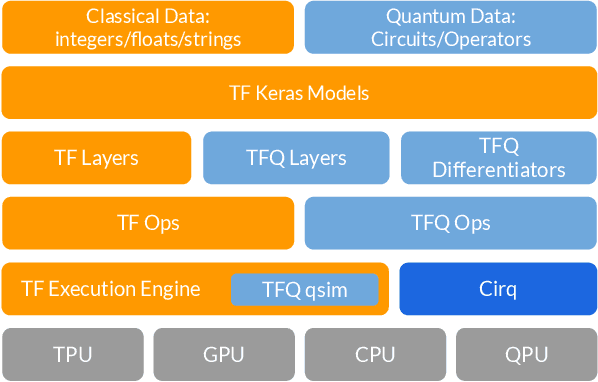Philip Massey
TensorFlow Quantum: A Software Framework for Quantum Machine Learning
Mar 06, 2020



Abstract:We introduce TensorFlow Quantum (TFQ), an open source library for the rapid prototyping of hybrid quantum-classical models for classical or quantum data. This framework offers high-level abstractions for the design and training of both discriminative and generative quantum models under TensorFlow and supports high-performance quantum circuit simulators. We provide an overview of the software architecture and building blocks through several examples and review the theory of hybrid quantum-classical neural networks. We illustrate TFQ functionalities via several basic applications including supervised learning for quantum classification, quantum control, and quantum approximate optimization. Moreover, we demonstrate how one can apply TFQ to tackle advanced quantum learning tasks including meta-learning, Hamiltonian learning, and sampling thermal states. We hope this framework provides the necessary tools for the quantum computing and machine learning research communities to explore models of both natural and artificial quantum systems, and ultimately discover new quantum algorithms which could potentially yield a quantum advantage.
Generating Logical Forms from Graph Representations of Text and Entities
May 21, 2019



Abstract:Structured information about entities is critical for many semantic parsing tasks. We present an approach that uses a Graph Neural Network (GNN) architecture to incorporate information about relevant entities and their relations during parsing. Combined with a decoder copy mechanism, this approach provides a conceptually simple mechanism to generate logical forms with entities. We demonstrate that this approach is competitive with state-of-the-art across several tasks without pre-training, and outperforms existing approaches when combined with BERT pre-training.
Annotating Character Relationships in Literary Texts
Dec 02, 2015

Abstract:We present a dataset of manually annotated relationships between characters in literary texts, in order to support the training and evaluation of automatic methods for relation type prediction in this domain (Makazhanov et al., 2014; Kokkinakis, 2013) and the broader computational analysis of literary character (Elson et al., 2010; Bamman et al., 2014; Vala et al., 2015; Flekova and Gurevych, 2015). In this work, we solicit annotations from workers on Amazon Mechanical Turk for 109 texts ranging from Homer's _Iliad_ to Joyce's _Ulysses_ on four dimensions of interest: for a given pair of characters, we collect judgments as to the coarse-grained category (professional, social, familial), fine-grained category (friend, lover, parent, rival, employer), and affinity (positive, negative, neutral) that describes their primary relationship in a text. We do not assume that this relationship is static; we also collect judgments as to whether it changes at any point in the course of the text.
 Add to Chrome
Add to Chrome Add to Firefox
Add to Firefox Add to Edge
Add to Edge